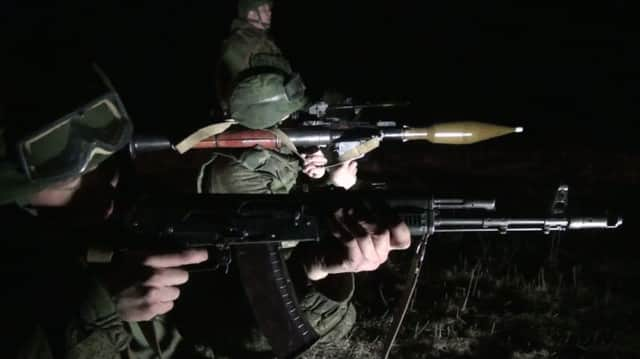Ukraine: Russian border troops begin exercises


THOUSANDS of Russian troops started military exercises close to the border with Ukraine yesterday, as tensions reached new levels ahead of Crimea’s referendum on whether or not to join Russia.
Russia’s defence ministry confirmed that more than 8,000 troops were involved in the manoeuvres along with heavy artillery, rocket launchers and anti-tank weapons.
Advertisement
Hide AdAdvertisement
Hide AdForeign Secretary William Hague issued a plea for Sunday’s vote to be called off, warning Russia that European travel bans and the freezing of assets will be imposed unless progress is made on tackling the Ukraine crisis.
Ahead of talks in London between US secretary of state John Kerry and Russian counterpart Sergey Lavrov, Mr Hague said the referendum would not be “legal or legitimate”.
It came as German vice-chancellor Sigmar Gabriel said it was in Russian president Vladimir Putin’s hands whether the Cold War era returned.
Mr Hague said: “Part of the answer to finding ways of de-escalating is for this referendum to be called off and for international negotiations to take place.
“If there is no progress on these things in the next few days then we will move to the next stage of Europe’s response to this crisis which will involve travel bans and asset freezes on individuals in Russia.
“That will be discussed by European Union foreign ministers in Brussels. I will join that meeting, on Monday.”
If the referendum went ahead, he said it would “almost certainly trigger stage two” of the EU’s three-phase sanctions plan, which could target Russian politicians and officials.
However, any escalation in diplomatic and economic pressure against Russia could lead to retaliation by Moscow, with European gas supplies and investment in financial centres such as the City potentially vulnerable.
Advertisement
Hide AdAdvertisement
Hide AdMr Hague said: “It’s important to take a united stand together but at the same time, and I stress this, it’s very important to use every possible diplomatic avenue to seek an improvement in the situation and agree the way forward to keep in full communication with Russia about the situation.”
Mr Hague said that Prime Minister David Cameron had spoken with Mr Putin four times since the crisis began. But in a sign of frustration with Moscow’s attitude, when asked whether he sensed any softening of the mood in the Kremlin, Mr Hague said that they had not used any opportunity to de-escalate the situation.
He added that the talks would be “a crucial moment for discovering, given the effective deadline of Sunday’s referendum, whether they really do want to de-escalate the situation”.
However, Mr Putin is reported to have told a meeting of his security council that this was an inter-Ukrainian crisis that “arose not through our fault, but we are involved in it, one way or another”.
He said he now wanted to discuss possible ways to “build relations with our partners and friends in Ukraine and our other partners in Europe and the United States.”
But in a sign of the tension spreading beyond Ukraine’s borders, Belarus – a Russian ally – has asked Moscow to deploy extra fighter jets and military transport aircraft after Nato boosted its forces in the neighbouring Baltic countries.
Meanwhile, United States F-16 fighter jets landed at central Poland’s Lask airbase yesterday to take part in military exercises seen as Washington’s gesture of support for its eastern Nato allies after Russia’s intervention in Ukraine.
At least 12 F-16 planes and 300 personnel were due to take part in the drills, beefed up at Warsaw’s request in the wake of Russia’s incursion in the Ukraine.